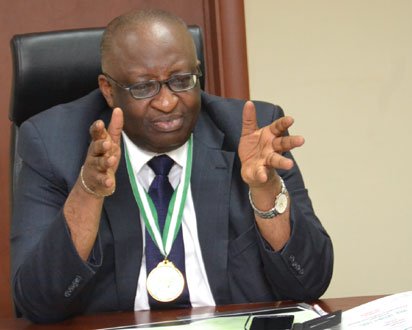In the wake of the country’s dwindling foreign earnings occasioned by continuous fall in the global crude oil price, economic stakeholders have stated that non-oil budgeting is sustainable despite its challenges.
Prof. Akpan Hogan Ekpo, Department of Economics, University of Uyo, who spoke to The Nation in an exclusive interview, noted that budgeting without oil revenue can be achieved by providing the basic needs of life such as health, education, housing, food, shelter, jobs, and security to at least 85 per cent of Nigerians.
Akpan said; “It is not entirely correct to say that oil cannot grow the economy. It can but it depends on how and what the oil revenue is used for. In the short and medium terms, oil as a non-renewable asset, the revenue so derived can be targeted at hard and soft infrastructure. Investment in hard infrastructure like power, roads, rails, etc and soft infrastructure (education and health) would enhance growth.
“If crude oil is refined in Nigeria and exported, the economy would earn foreign exchange. The oil sector could provides inputs for the chemical, pharmaceutical and agricultural sub-sectors and the resultant backward and forward linkages would grow the economy, generate jobs and provide revenue for government.
“For Nigeria, the oil revenue is perceived as permanent and hence every activity in the economy is dependent on revenue earned from crude oil export. The revenue from oil is exogenous; Nigeria has no control over its price and quantity. It is the vulnerability, uncertainty and price and output fluctuations that pose huge challenges for the country.”
He pointed out that it is unhealthy to finance development from an exogenous source of revenue with the features so described, stressing that the present covid-19 pandemic and the collapse in oil prices (twin challenge) has driven the economy into deep recession.
The Professor of economics maintained that economic diversification is the way out of the present economic quagmire, adding that diversification largely depends on the strategy of government and its economic development philosophy.
The National Chairman of Non-metallic Mining Group of Manufacturers Association of Nigeria (MAN) Mr. Afam Mallinso Ukatu, stated that most countries have survived without oil and are doing well, saying that Nigeria can fund its budget adequately through mining and agriculture if only infrastructure is put in place.
Ukatu noted that the current pandemic is an opportunity for Nigeria to leverage and change its narratives by diversifying into other forms of investment opportunities available in the 744 Local Government Areas of the country.
“The money doled out for SMEs is not getting to them because of bureaucracies involved and documentations that may not be easy for them to provide early enough.
“The opportunities in mining cannot be ruled out, but the necessary infrastructure should be put together, so that agriculture and mining could take their right position. This is because all the agricultural produce gets bad within three days, even before they get to the market. But if there is constant power supply, a lot of interested investors would invest in the value chain processing and jobs would created, while wastages would be minimised and the overall GDP would be enhanced. By this, there would be conservation of scarce forex earnings, which will also lead not only to food sufficiency but also to food export,” he stressed.
Ukatu expressed that boosting agriculture; mining and other non-oil sector should be the government’s priority now, adding that it can conveniently fund the nation’s budget without considering oil earnings.
